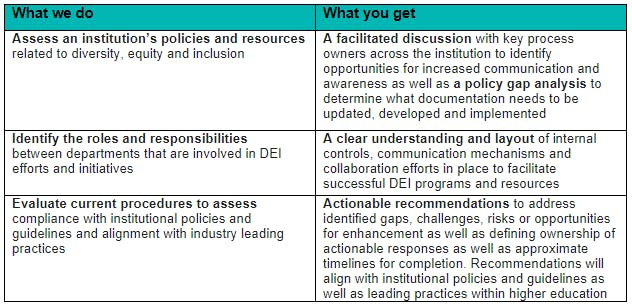
Article
Diversity, equity and inclusion in higher education: creating a positive and successful experience for all students
Diversity, equity and inclusion (DEI) continues to be strategic priority for many higher education institutions. A sound DEI framework, including robust institutional protocol, effective communication mechanisms, programming and training to support that framework, will lead to an enhanced student experience and success.
Key risks associated with DEI
DEI-related matters continue to be inherently high risk within higher education institutions across the country. Some of the key risks associated with DEI include:
Insufficient institutional protocol
A lack of formalized policies and procedures as well as insufficient or ineffective internal controls may lead to ambiguity or inconsistencies when handling DEI-related matters.
Campus community diversity
Institutions may lack diversity among their students, faculty and staff. A lack of diversity may indicate a culture perceived as unwelcoming or even hostile to certain groups of people. This can lead to a negative impact on the institution's reputation, recruitment and admissions and may also lead to legal challenges.
Harassment and discrimination-related incidents
Institutions may face DEI risks if they do not have effective policies and procedures in place to prevent harassment and discrimination and to respond to and implement corrective measures if an incident does occur. For example, students, faculty or staff may experience harassment or discrimination based on their race, gender, sexual orientation, religion or disability, which can lead to legal disputes and harm the institution's reputation.
Inequities in access and success
Institutions may also face DEI risks if certain groups of students do not have equal access to educational opportunities or if they do not achieve success at the same rates as other groups. This can lead to a lack of diversity among students and may also result in legal challenges as well as adversely impact the institution's reputation.
While the list above identifies some of the key risks associated with DEI, it is not comprehensive. There are numerous DEI-related risks that institutions should be aware of. Therefore, it is critical for institutions to identify the risks and ensure there are sufficient mitigation strategies in place to effectively navigate the current DEI landscape.
Baker Tilly can help
Baker Tilly can help institutions enhance their current DEI framework and approach by evaluating the strategic plan and assessing the infrastructure in place to support that plan as well as evaluating how departments across the institution handle DEI-related incidents. Our team will provide recommendations to strengthen efforts based on the results of the audit approach as well as leading practices.
Diversity, equity and inclusion assessment in action

Client need
An outsourced internal audit client identified the need to assess their DEI framework.
Baker Tilly solution
The Baker Tilly team reviewed applicable university policies, procedures and other documentation related to DEI and conducted interviews with process owners and other personnel involved in diversity and inclusion programs to understand current practices. The team compared the institution’s programs and resources against peer institutions and industry best practices and provided recommendations for strengthening and enhancing operations, programs and resources.
Results achieved
Recommendations were presented to the client related to the strategy, staffing, programming and training. Since the completion of the review, management has:
- Finalized and distributed a DEI Strategic Plan and supporting action plans
- Evaluated staffing and scalability of resources
- Enhanced and increased training programs and educational resources
- Reviewed existing programming to determine inclusivity
For more information on DEI assessments, or to learn more about how Baker Tilly’s higher education internal audit specialists can help your institution, contact our team.

